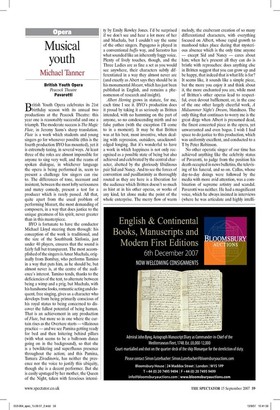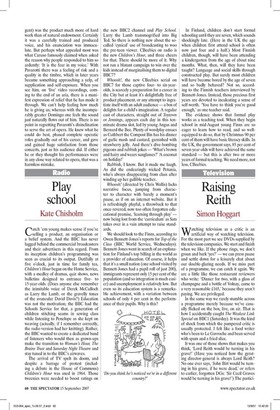Musical youth
Michael Tanner British Youth Opera Peacock Theatre Pavarotti British Youth Opera celebrates its 21st birthday season with its annual two productions at the Peacock Theatre: this year one is reasonably successful and one a triumph. The moderate success is The Magic Flute, in Jeremy Sams's sharp translation. Flute is a work which students and young singers go for whenever possible (this is the fourth production BYO has mounted), yet it is extremely taxing, in several ways. At least three of the roles are almost impossible for anyone to sing very well, and the reams of spoken dialogue, in whichever language the opera is being performed in, seem to present a challenge few singers can rise to. The differences of tone, incessant and insistent, between the most lofty seriousness and matey comedy, present a test for a producer which is rarely passed. All that, quite apart from the usual problem of performing Mozart, the most demanding of composers, in a way that does justice to the unique greatness of his spirit, never greater than in this masterpiece.
BYO is fortunate to have the conductor Michael Lloyd steering them through: his conception of the work is traditional, and the size of the Southbank Sinfonia, just under 40 players, ensures that the sound is fairly full but transparent. The most accomplished of the singers is Amar Muchala, originally from Bombay, who performs Tamino in a way that puts him, as he should be, but almost never is, at the centre of the audience's interest. Tamino tends, thanks to the deficiencies of the text, to alternate between being a wimp and a prig, but Muchala, with his handsome looks, romantic acting and eloquent, free singing, gives us a character who develops from being primarily conscious of his royal status to being concerned to discover the fullest potential of being human. That is an achievement in any production of Flute, but more so in one where the curtain rises as the Overture starts — villainous practice — and we see Pamina getting ready for bed and then loitering behind pillars (with what seems to be a ballroom dance going on in the background), so that she is a bewildering and superfluous presence throughout the action; and this Pamina, Tamara Zivadinovic, has neither the presence nor the voice to justify this ubiquity, though she is a decent performer. But she is easily upstaged by her mother, the Queen of the Night, taken with ferocious intensity by Emily Rowley Jones. I'd be surprised if we don't see and hear a lot more of her and Muchala, but I couldn't say the same of the other singers. Papageno is played in a conventional buffo way, and Sarastro has what sounded like an inherently foggy voice. Plenty of lively touches, though, and the Three Ladies are as fine a set as you would see anywhere, their characters subtly differentiated in a way they almost never are (and exactly as Abert says they should be in his monumental Mozart, which has just been published in English, and remains a phenomenon of research and insight).
Albert Herring grows in stature, for me, each time I see it. BYO's production does it proud by taking it as seriously as Britten intended, with no hamming on the part of anyone, so no condescending mirth and no false pathos (with the exception I'll come to in a moment). It may be that Britten was at his best, most inventive, when dealing with repression, outsiders, unacknowledged longing. But it's wonderful to have a work in which happiness is not only recognised as a possible state of being but also achieved and celebrated by the central character, abetted by the gloriously libidinous pair Sid and Nancy. And to see the forces of convention and pusillanimity as thoroughly routed as they are here is a liberation for the audience which Britten doesn't so much as hint at in his other operas, or works of any kind, let alone make the point of the whole enterprise. The merry flow of warm melody, the exuberant creation of so many differentiated characters, with everything focused on Albert, whose rapid growth to manhood takes place during that mysterious absence which is the only time anyone — except Sid and Nancy — cares about him; when he's present all they can do is bristle with reproaches: does anything else in Britten suggest that you can grow up and be happy, that indeed that is what life is for? It seems like, it sounds like a simple piece, but the more you enjoy it and think about it, the more enchanted you are, while most of Britten's other operas lead to respectful, even devout bafflement, or, in the case of the one other largely cheerful work, A Midsummer Night's Dream, blandness. The only thing that continues to worry me is the great dirge when Albert is presumed dead, the finest concerted piece in the opera, yet unwarranted and even bogus. I wish I had space to do justice to this production, which was uniformly excellent, and conducted to a T by Peter Robinson.
No other operatic singer of our time has achieved anything like the celebrity status of Pavarotti, to judge from the position his death occupied in news bulletins, the televising of his funeral, and so on. Callas, whose day-to-day doings were followed by the media with more avid attention, was a combination of supreme artistry and scandal. Pavarotti was neither. He had a magnificent voice, which he always insisted in interviews (where he was articulate and highly intelligent) was the product much more of hard work than of natural endowment. Certainly it was a carefully trained and produced voice, and his enunciation was immaculate. But perhaps what appealed most was what Caruso famously claimed when asked the reason why people responded to him so ardently: 'It is the fear in my voice.' With Pavarotti there was a feeling of risk and a quality in the timbre, which in later years became something approaching a yelp, of supplication and self-exposure. When you see him, on 'live' video recordings, coming to the end of an aria, there is a manifest expression of relief that he has made it through. We can't help feeling how much he is giving us; whereas with the incomparably greater Domingo one feels the sound just naturally flows out of him There is no point in regretting Pavarotti's disinclination to serve the art of opera. He knew what he could do best, phased complete operatic roles gradually out of his career, and gave and gained huge satisfaction from those concerts, just as his audience did. If either he or they thought his performances were in any close way related to opera, that was a harmless mistake.


























































 Previous page
Previous page